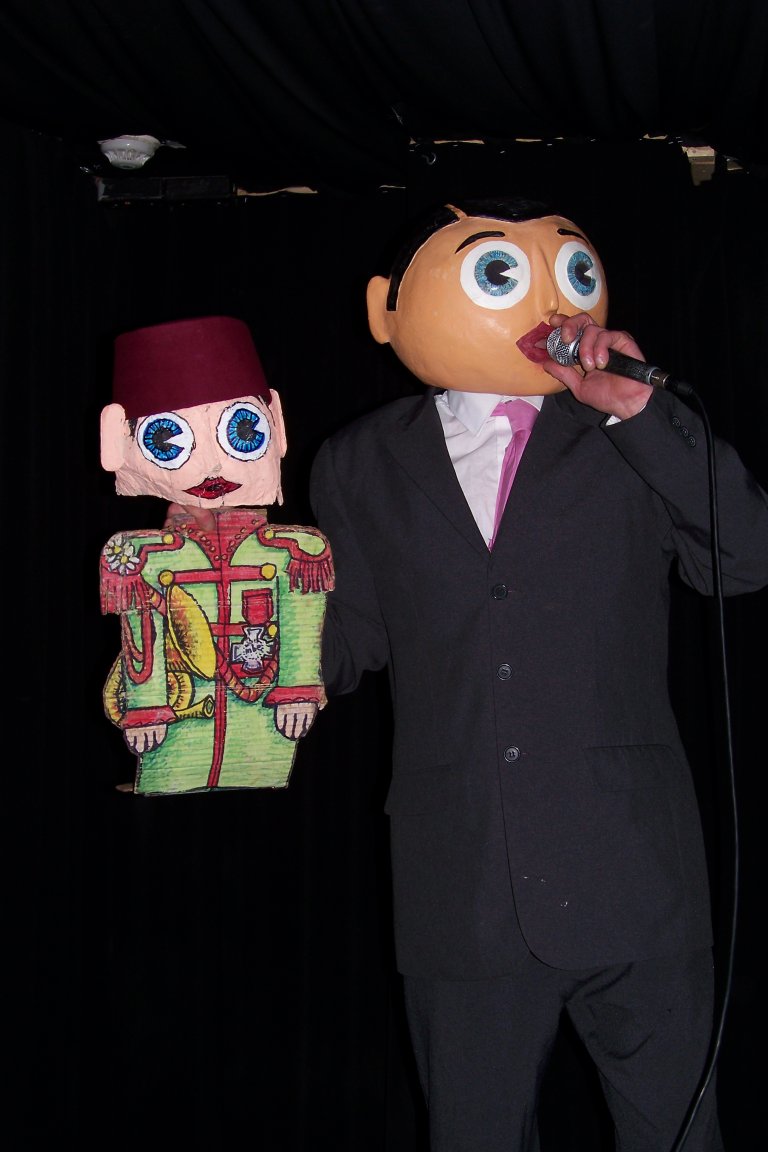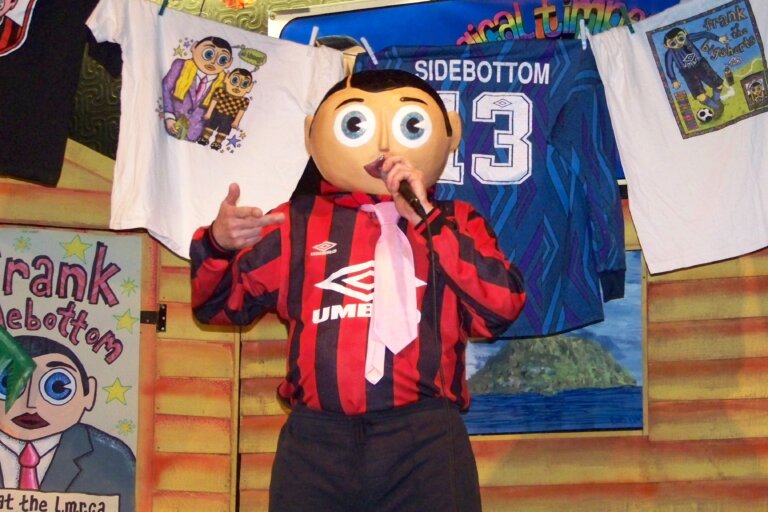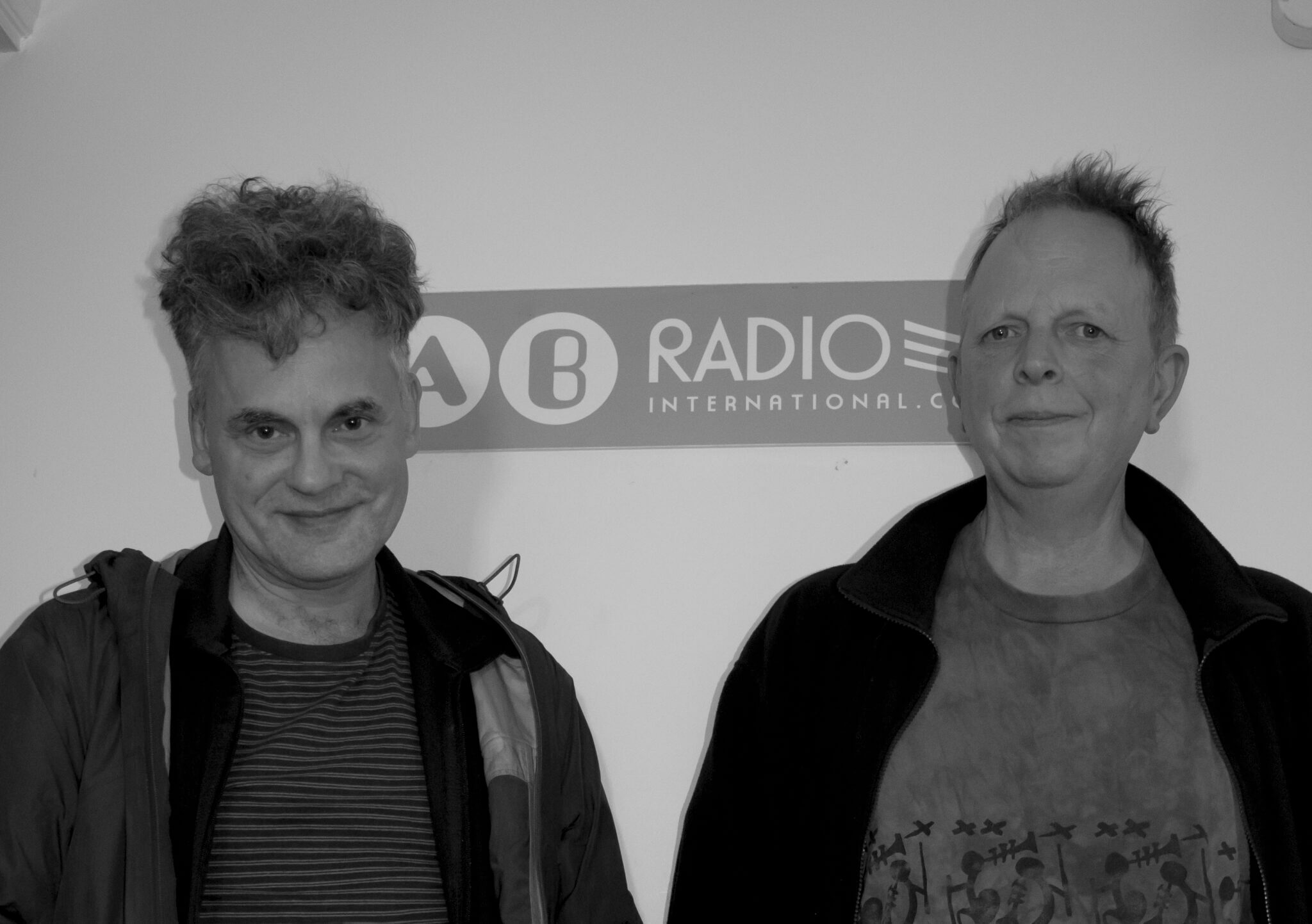
As they prepare to release their thirteen album, we caught up with Spaceheads, the trumpet-and-percussion duo of Andy Diagram and Richard Harrison to find out what we can expect.
Liverecs: How would you describe Spaceheads to a newcomer?
Andy Diagram: Well, what makes Spaceheads different is it’s instrumentation, I guess. it’s trumpet and drums, so people go ‘what?’ Is that it? Where’s the rest of the band? We were described once as like an understaffed jazz band, so yeah – we are an understaffed jazz band, we are not looking for new members though!
You’ve had a few guests over the years…
AD: We’ve had guests, yeah, and our last album was with a friend of ours who plays double bass, but generally, I generate my own bass lines on the trumpet, because I have the trumpet going through lots of effects and that creates a very big sound and then Richard sort of adds – well, go on, Richard what do you do?
Richard Harrison: I play various bits and bobs; I come up with a rhythm and I have to support the loops and if that doesn’t work, then we’ll change it. That’s how we grow things organically.
So it’s like a natural progression of the sound
AD: Yeah.
RH: Some loops don’t work.
AD: We generate, we write all our stuff by improvising, so we generate thousands of ideas basically while we are playing and the ones where the loop and the drums sort of gel are the ones that get developed.
You’ve got a new album, your thirteenth, due out very soon, safe to say it’s political in tone. Was that a conscious decision to create a sound track to the turbulent times we are facing as well as celebrate the people’s struggle?
RH: I think you’ve hit the nail on the head really on that. I mean it’s not obviously political music, but we are connecting it to those events and the times. Particularly the 100th anniversary –
AD: – it’s the 100th anniversary of the Russian revolution, which seems to be passing a lot of people by. The history of Russia over the last years has been turbulent but that doesn’t undo what that revolution represented in a lot of ways. You know, Russia they are trying to play it down, over here they are sort of ignoring it. As you said, we live in turbulent times, I think Spaceheads and what we do musically, we’ve always tried to connect it with the wider world. We don’t exist in our own arty vacuum, we try and sort of put stuff out that has some meaning to what’s going on and we’ve had quite a few sort of political tunes or titles in the past, anyway so, but this just seemed to be a theme for now, because as you said, things are changing fast, times are speeding up people are getting concerned. There’s a lot of conflict and there’s also a lot of hope that things can change for the better. We want to celebrate that really, we want to give people hope that things can change and can be better because I know too many people that just go ‘oooh this is the end, it’s terrible’.
It’s easy to think that.
AD It is easy to think that! But in a way, the rich and powerful probably want you to think that, because it’s like if you start getting optimistic that things can be better then you’re a danger to them.
It doesn’t do them any good.
AD: No, it doesn’t do them any good. So I think so I think a sort of optimism is a good thing to have. Pessimistic is what the rich and powerful would like us be.
The old divide and conquer – going on from that, it seems like we are in a contest at the moment to see which government can screw their own country over as much as possible. Which track on the new album would you dedicate to which leader?
AD: Well you know The Revolution Sashays up the Mall’s got to be dedicated to Putin, I guess. Because Putin, in Russia, he’s such a gay basher isn’t he? And think of sashaying as something quite camp. That title’s got a mixture of things in it; it’s got the sort of sashay and it’s got up the Mall which is –
RH: – towards the palace.
AD: The fact we go on about democracy all the time and we live in a monarchy, we are all the Queen’s subjects, that’s brushed aside. It’s worth reminding people it’s about democracy, everyone having a say. We’ve got a very undemocratic system we are living under and it’s sort of brushed aside. So that first track is dedicated to Putin and the Queen. Not that I’ve got anything against the Queen personally, I have to say that she’s a very nice old lady!
So it’s hard to say which track’s dedicated to which world leaders because the tracks are very much –
RH: – they are more towards populists.
AD: They are referencing struggle and populist movements throughout history. So we’ve been on the Peterloo ceremony in Albert Square [in Manchester], one of the tracks is sort of dedicated to that, the memory of it and references the Shelley poem [The Masque of Anarchy], To the Children Of A Wiser Day. And that’s sort of same throughout the album, the tracks are more referencing past struggles. Diggers and Dreamers references the Diggers struggle –
RH: – St George’s Hill –
AD: 14th/13th Century –
RH: – no later!
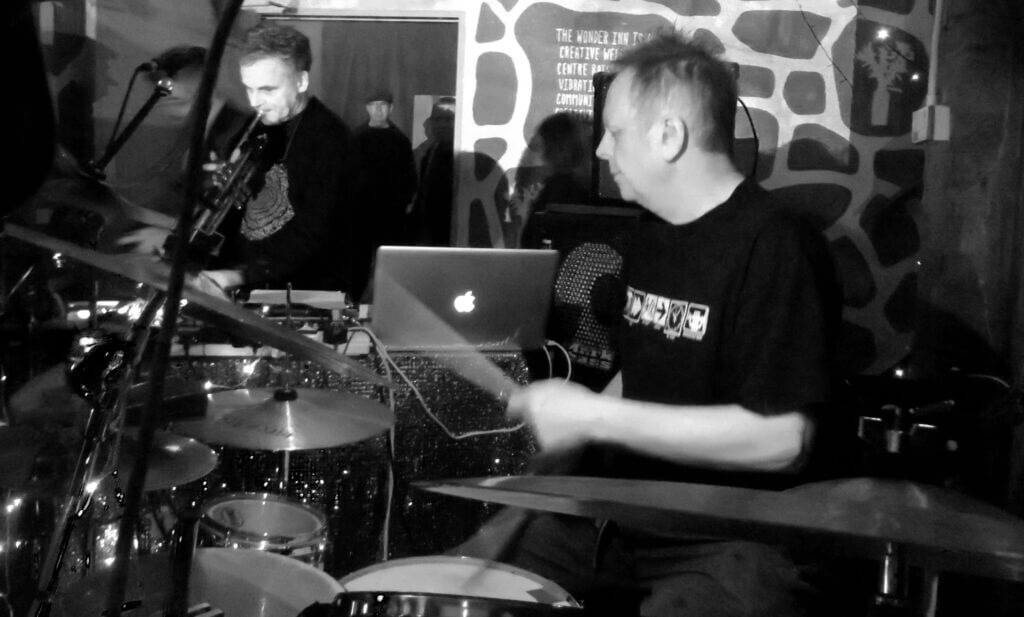
Let’s not have a political argument now!
AD: I’m crap at dates!
RH: 16 something, [1649] The song that Leon Rosselson wrote [The World Turned Upside Down]
AD: The point is that the album is celebrating, we want to generate optimism about the future as I said, in a previous question, optimism about the fact that things can change is really important. And when you reference the past then you see similar situations where people coming together have changed things. Where they got together in Manchester [at St Peter’s Fields, known as Peterloo] to fight for the right for representation and voting and they got mowed down. That’s going to make people really upset, they could have given up but no they carried on and that’s why we have got the vote today. You know, because ordinary people should have the right to vote. These things weren’t bestowed by the powers that be, people had to organise to make it happen and I think that’s what the album tries to reference throughout, although we reference lots of different things.
Fanfare for the Exiles, one of the tracks, is drawing attention to the fact the refugee situation in the world now is the worst it’s ever been according to United Nations records.
RH: The track is influenced by, during the setting up of apartheid in South Africa, there were a lot of jazz musicians – black and white – who played together, who weren’t allowed to when apartheid started to take hold, so they moved to London. There was a group of these black and white musicians had these bands; Chris McGregor’s Brotherhood of Breath, Dudu Pukwana and Spear, they existed in London and were a big influence on what we did.
AD: It inspired the drum beat, which made that track. You know, mentioning apartheid and the music that came out of the people’s struggle against it and you listen to the music, it’s really joyous, when people are struggling for better things, they need joyous music and hopefully that’s what we are trying to do.
As long as May the First wasn’t about Teresa…
RD: The actual title I picked out was a reference to a date in the Russian Revolution; I don’t know if it’s a specific one, International Labour Day, May 1st.
AD: It’s also an important day for Spaceheads, isn’t it? Always has been
RH: My birthday – but we haven’t said that on there. When’s your birthday?
AD: That’s the next album!
There’s a mix of styles this time. There are a lot of different styles in there and some additional voices this time as well. Who are the guests and particularly on Laugh in the Face of Power – there’s a voice on that one?
AD: There are no guests; the only guest is Jamie Rory Lucy, who does our visuals. He whistles on the end of The Revolution Sashays up the Mall, but the vocals are actually me and Richard! Well, Richard does one track and I do the other.
And it’s just tweaked?
AD: Well, a few effects on it, to make it sound a bit professional, I think we’ll do it live, won’t we?
[Richard looks worried]
AD: We need to practise it. I’m thinking because Space Rebel is Richard. You can shout that out at the beginning of the song and then I sample it, then during the song I can flash off the sample. That’s what I was thinking of doing. And Laugh in the Face of Power is one I sing. It’s funny because Laugh in the Face of Power has got a long history and was actually a very early Spaceheads song. We wrote in the early ‘90s and Spaceheads actually went on tour supporting James and Laugh In The Face Of Power was one of the songs we did on that tour. We released it as part of the cassette that went with that tour, so there are few people out there that have got a really early version of it.
Let’s see if they recognise it!
AD: Well, the music’s changed but the tune is the same and the words are the same, the bit that I sing.
RH: The start of the line, laugh In the face of power, I came up with that because you were recording something down at the studio in Withington, you were playing the trumpet line and the words just sort of came to me, as they do!
AD: That was in the early ‘90s when Spaceheads wasn’t quite defined, we did a lot more vocal things then. But then we sort of settled into just playing mostly. But this track, we had the jam in the studio and it sounded great. We were wondering what to do with it and then discovered that this vocal line from years ago fitted over it. It fitted the theme of the record as well. Laugh in the Face of Power is very much ‘I’m not going to be beaten down by the powers that be, I’m not going to be intimidated’. I think intimidation works. But I’d also say that it’s not just power in terms that the ‘powers that be’, it’s nice that it refers to power in everyday life. Power in relationships, which is why on the record cover I’ve got a picture of my mum and she’s got a women’s feminist badge on because my Mum is a very big feminist and always respected her for those ideas. I think feminism took on the power of patriarchy – the power of men – so Laugh in the Face of Power is a reference to that as well, power wherever you see it in relationships.
And we must say she’s flicking the ‘v’s as well.
AD: That was my idea she was up for it!
RH: That image of laughing! [Flicks ‘v’s].
AD: We’re thinking what we might do as the album release date gets closer is try and get people to tweet in themselves doing that – laughing in the face of power!
AD: Sitting Down at Standing Rock is one of the few that’s dedicated to an actual struggle that’s going on now. It’s a really interesting one because it’s a climate change struggle; a struggle to keep the oil in the ground because otherwise the planet’s going to burn. What’s interesting about it is the way that the Native Americans are in the front line of this, they are actually taking a stand. That’s got international attention and there’s a real sort of interest in big struggle and a real hopeful one, even though it’s touch and go. They’ve got a legal ruling in their favour recently; the oil pipeline has been built but they might be able to get something stopped I don’t know.
RH: Funnily enough, Trump’s very much involved in it.
AD: Space Rebel, the one Richard sings on, is influenced by a quote from Francesca Martinez: “The most rebellious thing you can do is be yourself”. She’s got cerebral palsy, she’s in a wheelchair and she’s a comedian, she’s very funny and has done a lot for disabled rights. I guess that’s another inspiring struggle that Space Rebel’s dedicated to – the disabled movement. The noise they’ve made about the cuts to disability benefits has been one of the loudest and strongest struggles. What they’ve achieved over the last few years in terms of disabled access to places now and it’s been actually written into laws. It shows that when people get together they can make, and people’s understanding of what disability is, everyone thinks it’s someone else; you’re only an accident away from it being you. Mother’s wheeling babies can’t go up and down steps, so the real understanding what the disability movement’s done has given us a real understanding of the way people actually live their lives and what they need.
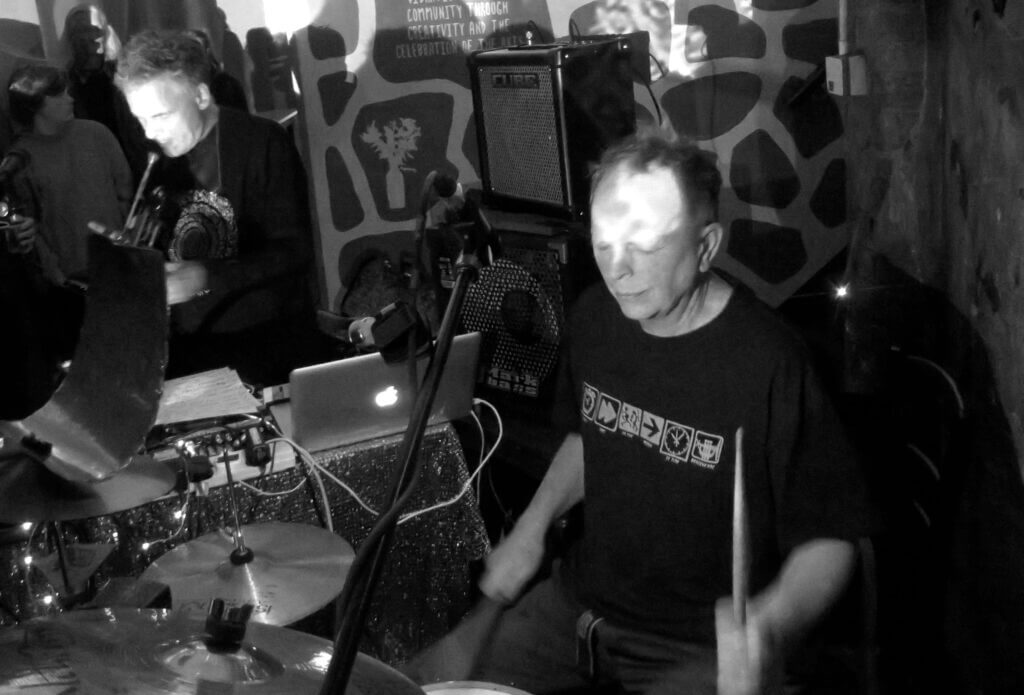
It’s actually quite ironic at the moment that we’ve come a long way with the access and things like that. Then the government start taking away a lot of stuff as well. The same with female rights and race rights and things like that. We’ve come so far, we think we’ve got a handle on it, it’s all doing great and then somebody gets in power and it goes backwards. So yeah, there’s always a struggle.
AD: It’s always a struggle. It never stops. What the struggling does – and I think this album is about that – is it produces hope and optimism. When you struggle and you might lose but you realise eventually you’re going to win. And I think it’s keeping optimistic, you look at the people fighting apartheid in the ‘70s, years of not getting anywhere but they eventually won, and they wrote a soundtrack to it, it’s the most joyous music you’ve ever heard. Hopefully, we are making a little contribution to that, we are not claiming to be anything else.
Considering how the last two LPs were recorded, A Short Ride on the Arrow of Time was basically jamming and Laughing Water was recorded over an eleven-year period, how did you approach this one?
RH: Obviously, it’s a lot newer, there are some older ones there that have sort of found their place, they can fit in with the other thing that we’ve been doing, the newer stuff. It’s kind of still a very similar process isn’t it, as Arrow of Time was the bare structures we would jam up, we would jam up structures, but then play around with them.
AD: They develop into more produced songs. Arrow of Time is quite rough and shows us at our rawest and we hadn’t had an album like that before and that quite an exciting thing to do. The way I see this one is more like the EPs we released like Trip to the Moon and Sun Radar. So they are quite well-produced and polished tracks but whereas the EPs tracks were mostly three minutes long; you get a bit of room on an album to extend them a bit, some of them are a bit longer. The feel is very much taking that EP idea and making an album of it. Arrow of Time was very much dedicated to the jamming process and Laughing Water was the old recordings with the double bass player. So this is I’d say, more a continuation of the Eps – would you say that?
RH: Yeah, yeah.
AD: Yeah and everything’s written by jams but on Arrow of Time, we kept it as close to the original as we could without it sounding really crap – minimal editing. But this has got quite a lot of editing and redoing bits and pieces.
RH: Sashay Down the Mall came out of when you had your last operation; when you were housebound, how many months were you housebound for?
AD: I wasn’t that housebound, I did James gigs on crutches! [Laughs]
RH: Anyway, you were spending a lot of time at home after the op, so I was recording things. Sashay was just me banging a log; banging my big drum with it. So I just sent the recordings up to Andy to see if he could come up with anything.
AD: There’s quite a mixture of stuff; track two, What Is To Be Done, is a similar sort of thing.
RH: I’d get a pattern going, throw them at Andy, and see what he came up with.
AD: Some of them, like the Peterloo one To the Children of a Wiser Day, are quite old tracks, they’ve been around five or six years and were considered for the EP but they were just too long. They were recorded at the same time as Sun Radar and stuff like that but we didn’t have a place to put them and this is it. It’s a bit of a mixture but hopefully, the theme behind it has tied it all together.
It’s a very cohesive record. Richard, you mentioned just then about the log and things like that and you make use of almost anything that makes a noise, are you always on the lookout for something new and unusual to play?
RH: Of course, it’s what I do! I don’t learn notes or read music but I look for noise.
Want’s the weirdest thing you’ve got in your arsenal?
RH: At the minute, I have a couple of plastic pigs that squeak and you can play them rhythmically. The weirdest? I’ve got some Second World War bomb cases – they sound really nice. I can’t help seeing them without thinking, what have they done to get to that stage? Strangest… I’m making a frame of sea shells for creating a washy noise. That’s the thing I’m making at the minute in my bedroom, much to my wife’s disgust. I’m always on the lookout for something.
AD: And the Harrison – that features on few videos on The Arrow of Time doesn’t it?
RH: It’s a frame. Lots of bells and things on it, mainly a load of bean tin lids. It looks like scales of a fish. You can rattle it; it gives a nice shimmery sound. You will hear that most on Mon’s Dream.
We’ve seen you live numerous times in some very quirky venues; want’s the strangest place you’ve played?
RH: The ship that was rescued out of New York harbour –
AD: – The Frying Pan! That was pretty mad!
RH: It felt like it was in a room not much bigger than this but there were all these portholes and bits everywhere. People with their heads coming in; that was mad!
AD: It was in New York harbour, it was a birthday party for –
RH: – Wavy Gravy’s 60th birthday party!
AD: It was a great gig! He didn’t know – he didn’t care! It was a mad boat that; because we are a duo, we can get around quite a lot so we’ve travelled around the world touring. That was sort of part of the idea of Spaceheads in the first place, the flexibility of just being two, what it gave us in terms of rehearsing and touring. And in terms of wanting to play places, we’ve always looked for similar people to work with in terms of promoting our gigs abroad; alternative venues. There’s nothing more disappointing to us when we turn up at a venue and there are bouncers on the door and rip-off bar prices. No, we’d much rather play in a church in Whalley Range or find places which are more community run and don’t rely on that sort of usual thing. It’s meant that we’ve been outside the mainstream, but I think we are outside the mainstream anyway, so it doesn’t really bother us. We’re not trying to get on Top of the Pops or whatever it is.
RH: That tour that we did in America was just brilliant, it was a real hand-to-mouth tour over two and a half months, People were organising gigs on the side of the motorways as we were going around.
Just on the fly?
RH: We’d do anything from somebody’s basement to somebody’s back garden or an art centre. We were meeting with all these social groups and anarchist groups all around America, there’s really nice people out there.
AD: People would have gigs in their houses quite regularly in America because they’ve got big houses, they are not necessarily that rich, they just have a basement, you can get fifty, sixty people in there, amazing!
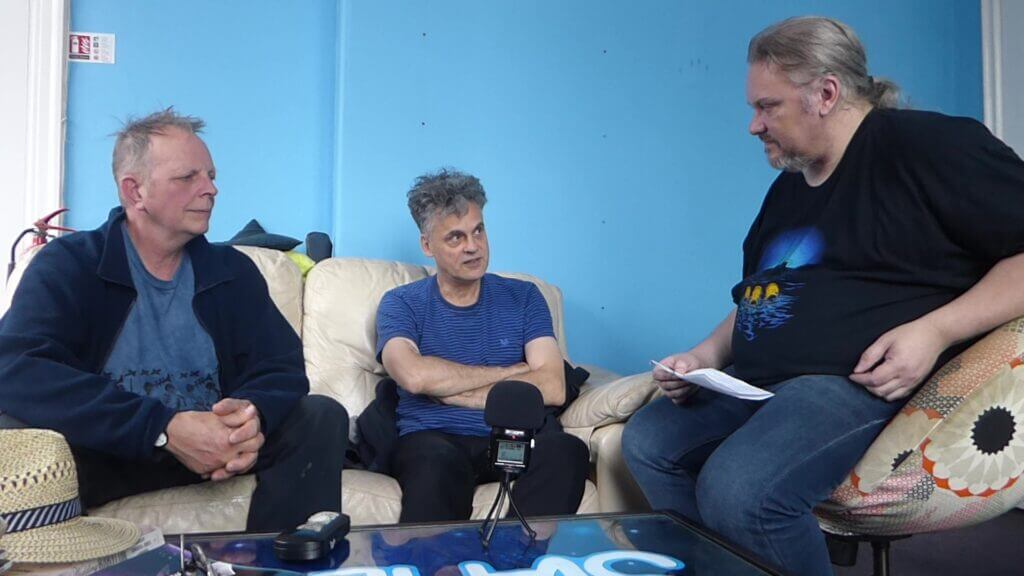
So where can people catch you live next?
AD: We’re on October 13th at Hermons chapel which is a regular one down in Oswestry. We play Manchester Science Festival on October 28th, and we are having an album launch on the farm where we did the latest video, where we have parties every year and that’s on the November 4th. We are negotiating a lot of gigs at the moment and suggest people go to our website spaceheads.co.uk/gigs where we will start to list them. We tend to put them in a month before we play them, even though we organise them two or three months before.
The new album A New World in Our Hearts is released on Electric Brass Records on November 7th (which coincides with the centenary of the 1917 Russian Revolution) and you can pre-order the CD, LP, or Digital Download at the Spaceheads website. You can follow the band on Twitter and Facebook for up to date gig news and videos. Read our review of a recent live show here.
Originally published on the Sounds Magazine website (noe defunct).

